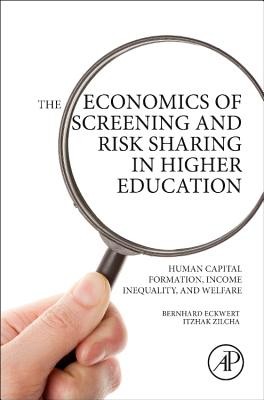
- Išsiųsime per 10–14 d.d.
- Autorius: Bernhard Eckwert
- Leidėjas: Academic Press
- ISBN-10: 0128031905
- ISBN-13: 9780128031902
- Formatas: 15.2 x 22.9 x 1 cm, minkšti viršeliai
- Kalba: Anglų
- Extra -15 % nuolaida šiai knygai su kodu: ENG15
The Economics of Screening and Risk Sharing in Higher Education + nemokamas atvežimas! | knygos.lt
Atsiliepimai
Aprašymas
The Economics of Screening and Risk Sharing in Higher Education explores advances in information technologies and in statistical and social sciences that have significantly improved the reliability of techniques for screening large populations. These advances are important for higher education worldwide because they affect many of the mechanisms commonly used for rationing the available supply of educational services. Using a single framework to study several independent questions, the authors provide a comprehensive theory in an empirically-driven field. Their answers to questions about funding structures for investments in higher education, students' attitudes towards risk, and the availability of arrangements for sharing individual talent risks are important for understanding the theoretical underpinnings of information and uncertainty on human capital formation.
EXTRA 15 % nuolaida su kodu: ENG15
Akcija baigiasi už 1d.06:29:34
Nuolaidos kodas galioja perkant nuo 10 €. Nuolaidos nesumuojamos.

- Autorius: Bernhard Eckwert
- Leidėjas: Academic Press
- ISBN-10: 0128031905
- ISBN-13: 9780128031902
- Formatas: 15.2 x 22.9 x 1 cm, minkšti viršeliai
- Kalba: Anglų
The Economics of Screening and Risk Sharing in Higher Education explores advances in information technologies and in statistical and social sciences that have significantly improved the reliability of techniques for screening large populations. These advances are important for higher education worldwide because they affect many of the mechanisms commonly used for rationing the available supply of educational services. Using a single framework to study several independent questions, the authors provide a comprehensive theory in an empirically-driven field. Their answers to questions about funding structures for investments in higher education, students' attitudes towards risk, and the availability of arrangements for sharing individual talent risks are important for understanding the theoretical underpinnings of information and uncertainty on human capital formation.




Atsiliepimai